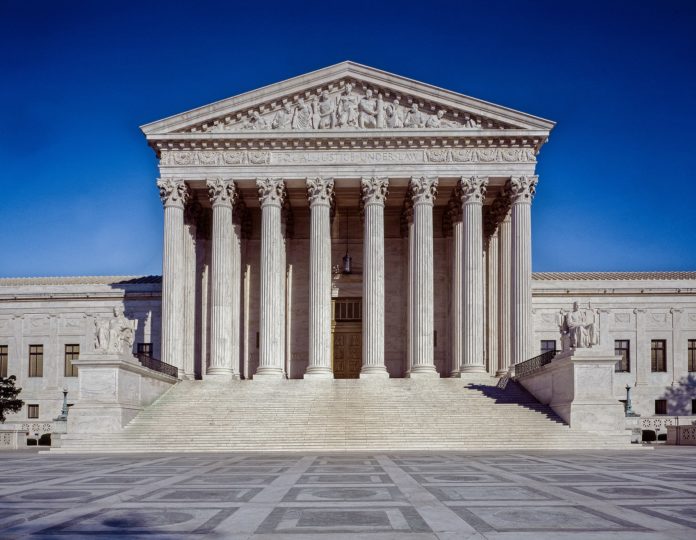
The U.S. Supreme Court will hear oral arguments Dec. 5 in a Colorado appeal over religious exemptions to public accommodation laws.
The high court released its oral argument calendar for the last week in November and first week in December on Oct. 18. It will hear nine appeals including 303 Creative v. Elenis, an appeal from the 10th Circuit Court of Appeals over the constitutionality of the Colorado Anti-Discrimination Act. 303 Creative v. Elenis is set for one hour of oral arguments starting at 10 a.m. Dec. 5.
The Supreme Court agreed to hear the case in February and limited it to the question of “Whether applying a public-accommodation law to compel an artist to speak or stay silent violates the Free Speech Clause of the First Amendment.”
The case is the second time the Supreme Court will consider CADA after it issued a narrow ruling in the 2018 case Masterpiece Cakeshop v. Colorado Civil Rights Commission. The 2018 decision wasn’t based on the merits of CADA, which the latest appeal is centered on.
303 Creative v. Elenis came after Colorado web designer Lorie Smith filed a pre-enforcement challenge against CADA in the U.S. District Court for the District of Colorado. According to the pre-enforcement challenge, Smith designs custom websites and said she’d like to offer custom designed wedding websites, but due to religious beliefs, she would not offer wedding sites to same-sex couples. Smith said she’d like to offer the service and include a disclaimer that she wouldn’t offer wedding websites to same-sex couples but is unable to do so due to CADA.
CADA bars discrimination by public accommodation providers based on a handful of protected classes including sexual orientation, gender identity, race and sex. CADA also prevents public accommodation providers from communicating that they will deny services based on protected classes. There are a few exemptions to CADA including certain sex-based restrictions and for public accomodations that are mainly used for religious purposes. At issue in the appeal is that CADA doesn’t offer exemptions for the deeply held religious beliefs of public accommodation providers.
In her pre-enforcement challenge, Smith argued CADA’s communication clause is facially overbroad, vague and violates the 14th Amendment and the due process clause. She also argued the entirety of CADA violates the First Amendment’s protection of free speech and free exercise.
The federal district court dismissed Smith’s case and she appealed to the 10th Circuit Court of Appeals.
In July 2021, a split panel of the 10th Circuit Court of Appeals ruled Smith had standing to bring the pre-enforcement challenge but CADA’s accommodation clause satisfied strict scrutiny test for laws that compel speech.
The appeals court singled out the nature of custom-made products to justify its decision. While LBGT couples could find another website designer, the 10th Circuit majority reasoned, requiring them to do so would “relegate LGBT consumers to an inferior market” since Smith’s products are “custom and unique” services. A business that offers a custom good or service is akin to a monopoly, the majority of the 10th Circuit ruled, which presents “unique anti-discrimination concerns.”
Dissenting from the 10th Circuit majority, Judge Timothy Tymkovich wrote that in his view the constitution squarely protects Smith from compelled speech that is in conflict with her religious beliefs. Tymkovich said he understood the interest of Colorado in protecting citizens from discrimination but that compelling her to offer her services to same-sex couples would “single out her speech and religious beliefs for discriminatory treatment under the aegis of anti-discrimination laws.”
303 Creative is already one of the most watched cases this session both locally and nationally. The appeal has amassed 57 amicus briefs from across the country with different amici urging the court to rule in favor of Colorado and Smith. Nearly every state has its own public accommodation law with many also protecting sexual orientation and gender identity and the Supreme Court’s ruling could impact many state protections.
While the U.S. Supreme Court in 2018 never ruled on the underlying merits of CADA, the 2022 court looks remarkably different and possibly poised to rule in favor of Smith.
The current U.S. Supreme Court has a 6-3 majority of conservative-appointed justices and several of the conservative justices have spoken out over laws and requirements without religious exemptions.
In 2018, Justice Clarence Thomas and Justice Neil Gorsuch joined a partial concurrence with the majority in Masterpiece Cakeshop and specifically addressed the case’s free speech questions. The justices expressed concern over the court’s ruling in Obergefell v. Hodges created conflicts with constitutional protections. “In future cases, the freedom of speech could be essential to preventing Obergefell from being used to ‘stamp out every vestige of dissent and ‘vilify Americans who are unwilling to assent to the new orthodoxy.’”
Last year the Supreme Court declined to grant injunctive relief over a handful of religious-based challenges to state COVID-19 vaccine mandates that didn’t offer religious exemptions. In a denying injunctive relief for a challenge to a Maine law, three of the court’s justices — Thomas, Gorsuch and Justice Samuel Alito — dissented, writing that “healthcare workers who have served on the front line of a pandemic for the last 18 months are now being fired and their practices shuttered. All for adhering to their constitutionally protected religious beliefs. Their plight is worthy of our attention.”
In another denial of injunctive relief for a similar New York law without religious COVID-19 vaccine exemptions, Thomas, Gorsuch and Alito dissented. Gorsuch and Alito wrote separately and echoed earlier concerns over a lack of religious exemptions to the requirement.

